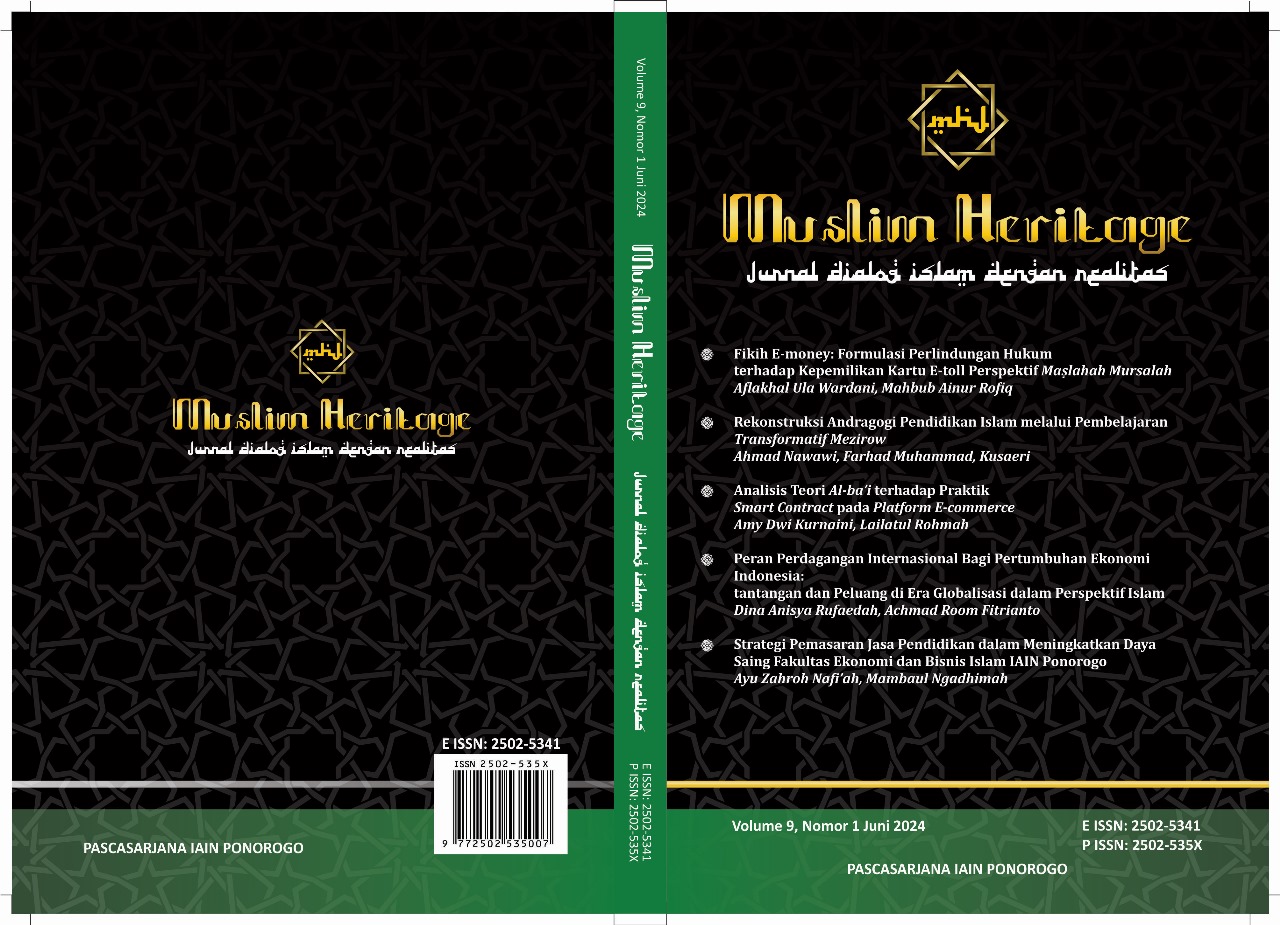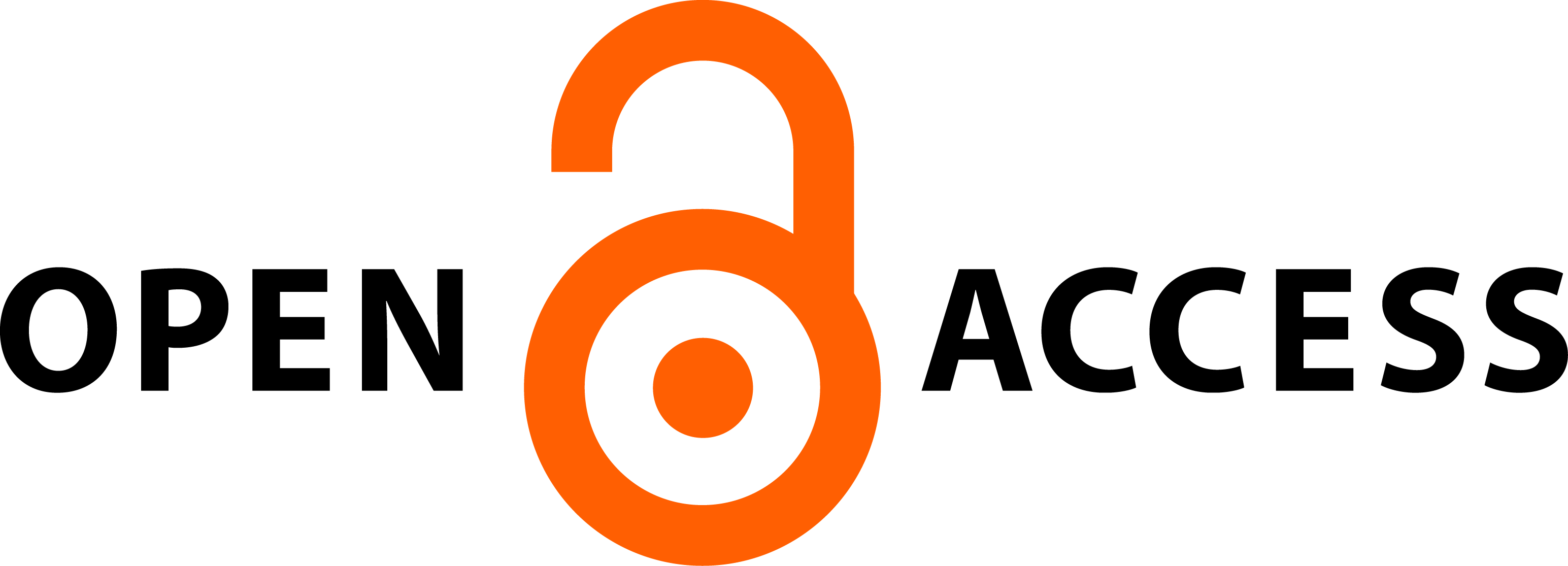FIKIH E-MONEY: FORMULASI PERLINDUNGAN HUKUM TERHADAP KEPEMILIKAN KARTU E-TOLL PERSPEKTIF MAá¹¢LAHAH MURSALAH
DOI:
https://doi.org/10.21154/muslimheritage.v9i1.8752Abstract
Abstract
Transactions on toll roads, which initially involved cash payments, have now been converted
to cashless transactions using e-toll cards. The use of e-toll cards is considered more efficient
because it allows faster transactions and reduces congestion on toll roads. However, e-toll
cards are a form of unregistered electronic money that does not have a password or PIN. As a
result, the e-toll card issuer cannot provide compensation if the e-toll card is damaged or lost.
Therefore, e-toll card users feel disadvantaged and their rights as consumers are not fulfilled.
This research focuses on discussing the shortcomings of e-toll cards that can cause harm to
their users. Furthermore, this research analyzes the importance of legal protection for e-toll card
users as a non-cash payment instrument. In addition, this research also analyzes the ideal legal
protection recommendations for e-toll card users based on the maslahah mursalah perspective.
The research method used is normative legal research with a legal and conceptual approach. The
results of this study show that there is a legal vacuum in Bank Indonesia Regulation (PBI) No.
20/6/2018 on electronic money, as it does not provide adequate security for e-toll cards, which
fall under the category of unregistered electronic money. Legal protection for e-toll card users is
very important because the rights related to convenience, security, and compensation for e-toll
card users have not been fully met. Therefore, the ideal legal protection recommendations for
e-toll card users from the perspective of maslahah mursalah are to change the e-toll card system
to be registered, to provide a password or PIN on the e-toll card, to revise the standard clause
to provide compensation for damage or loss of e-toll cards, and to provide facilities through
digital wallet applications (e-wallet). To realize these recommendations, of course, government
awareness is needed to be more assertive in determining policies.
Abstrak
Transaksi di jalan tol yang awalnya menggunakan pembayaran tunai, kini telah berubah
menjadi non-tunai dengan menggunakan kartu e-toll. Kartu e-toll dianggap lebih efisien karena memungkinkan transaksi lebih cepat dan mengurangi kemacetan di jalan tol. Walaupun demikian,
kartu e-toll merupakan uang elektronik unregistered yang tidak dilengkapi dengan password atau
PIN. Keadaan ini menyebabkan penerbit kartu e-toll tidak dapat memberikan ganti rugi jika kartu
e-toll mengalami kerusakan atau kehilangan. Akibatnya, pengguna kartu e-toll dirugikan dan
tidak terpenuhi haknya. Penelitian ini fokus membahas kekurangan pada kartu e-toll yang dapat
menyebabkan kerugian bagi penggunanya. Selanjutnya, penelitian ini mengungkap pentingnya
perlindungan hukum bagi pengguna kartu e-toll sebagai alat pembayaran non-tunai. Selain itu,
penelitian hendak memberikan rekomendasi perlindungan hukum yang ideal terhadap pengguna
kartu e-toll berdasarkan perspektif maslahah mursalah. Metode penelitian yang digunakan adalah
yuridis normatif dengan pendekatan perundang-undangan dan konseptual. Hasil penelitian ini
menunjukkan bahwa terdapat kekosongan hukum dalam Peraturan Bank Indonesia (PBI) nomor
20/6/2018 tentang uang elektronik, karena belum memberikan keamanan yang memadai untuk
kartu e-toll sebagai uang elektronik unregistered. Perlindungan hukum bagi pengguna kartu e-toll
sangat penting dalam rangka memenuhi hak-hak terkait kenyamanan, keamanan, dan ganti rugi
bagi pengguna kartu e-toll yang belum terpenuhi. Oleh karena itu, rekomendasi perlindungan
hukum yang ideal terhadap pengguna kartu e-toll dalam perspektif maslahah mursalah yaitu,
mengubah sistem kartu e-toll menjadi terdaftar, memberikan password atau PIN, merevisi klausula
baku dengan memberikan ganti rugi atas kerusakan atau kehilangan kartu e-toll dan menyediakan
fasilitas aplikasi dompet digital (e-wallet). Untuk mewujudkan rekomendasi tersebut, tentunya
perlu ada kesadaran pemerintah untuk lebih tegas dalam menentukan kebijakan.
References
Affarudin, Muhammad Agung Ilham. “Implementasi Peraturan Bupati Gunungkidul Nomor 36 Tahun 2015 Tentang Pencegahan Perkawinan Pada Usia Anak Dalam Perspektif Maslahah Mursalah.” Al-Hukama’ 9, no. 1 (2019): 103”“29. https://doi.org/10.15642/alhukama.2019.9.1.103-129.
Almaida, Zennia, and Moch. Najib Imannullah. “Perlindungan Hukum Preventif Dan Represif Bagi Pengguna Uang Elektronik Dalam Melakukan Transaksi Ton Nontunai.” Angewandte Chemie International Edition, 6(11), 951”“952. 3, no. 1 (2018): 1”“10. https://medium.com/@arifwicaksanaa/pengertian-use-case-a7e576e1b6bf.
Baihaqi, Muhammad Imam. “Analisis Hukum Ekonomi Islam Terhadap Klausula Baku Kepemilikan E-Toll Card,” 2020. https://eprints.walisongo.ac.id/id/eprint/14187/.
Hasanah, Lutfiatul. “Perlindungan Hukum Bagi Konsumen Pengguna E-Toll Card Bank Mandiri Dalam Perspektif Undang-Undang No. 8 Tahun 1999 Tentang Perlindungan Konsumen (Studi Kasus Di Bank Mandiri Kec Rambipuji Jember).” IAIN Jember, 2020. http://digilib.uinkhas.ac.id/23268/.
Muhammad Alfian Williandanu, and Arikha Saputra. “Perlindungan Hukum Terhadap Penggunaan Uang Elektronik Pada Jalan Tol (E-Toll) Ditinjau Dari Undang-Undang Nomor 8 Tahun 1999 Tentang Perlindungan Konsumen.” The Juris 6, no. 2 (2022): 314”“18. https://doi.org/10.56301/juris.v6i2.597.
Rofiq, Mahbub Ainur, and Tutik Hamidah. “STATUS ANAK LUAR NIKAH (Judicial Activism Mahkamah Konstitusi Dalam Putusan Nomor 46/PUU- VII/2010 Perspektif Mashlahah Izzuddin Bin Abdissalam).” Journal of Business Theory and Practice 10, no. 2 (2021): 6. http://www.theseus.fi/handle/10024/341553%0Ahttps://jptam.org/index.php/jptam/article/view/1958%0Ahttp://ejurnal.undana.ac.id/index.php/glory/article/view/4816%0Ahttps://dspace.uii.ac.id/bitstream/handle/123456789/23790/17211077 Tarita Syavira Alicia.pdf?
Silalahi, W. “Urgensi Perlindungan Konsumen Berbasis Teknologi Digital (the Urgence of Consumer Protection Based on Digital Technology).” Prosiding Serina, 2022, 589”“98. https://journal.untar.ac.id/index.php/PSERINA/article/view/19644%0Ahttps://journal.untar.ac.id/index.php/PSERINA/article/view/19644/12108.
Wiwik Dyah Aryani, Abdul Holik, Asyifa Nur Rohmah, Noor Falah, Sodikin, Neng Ely Alawiyah, Asyif Zainal Mutaqin, Aziz T. Mutaalimin, Oom Komalasari, Aam Ridwan Mustopa. Ushul Fiqih. 1st ed. Bandung: Widina Bhakti Persada Bandung, 2023. www.penerbitwidina.com.
Dahlan, Abd. Rahman, Ushul Fiqh, Jakarta: Amzah, 2018.
Burhanuddin, Pemikiran Hukum Perlindungan Konsumen dan Sertifikasi Halal, Malang: UIN-Maliki Press, 2011.
Barkatulah, Abd. Halim. Hukum Perlindungan Konsumen Kajian Teoritis dan Perkembangan Pemikiran, Banjarmasin: FH Unlam Press, 2008.
Kristiyanti, Celina Tri Siwi. Hukum Perlindungan Konsumen, Malang: Sinar Grafika, 2011
Budianto, Enggran Eko .“Viral Pengguna Tol Diminta Bayar Rp 1 juta Karena Kartu e-Toll Hilang,” Detiknews, 20 Desember 2019, diakses 6 September 2020, https://news.detik.com/berita-jawa-timur/d-4830546/viral-pengguna-tol-diminta-bayar-rp-1-juta-karena-kartu-e-toll-hilang
“Penggantian Kartu BRIZZI,” Bank BRI, diakses 21 Desember 2023, https://bri.co.id/other-term-brizzi
“Term and Condition TapCash,” Bank BNI diakses 21 Desember 2023, https://www.bni.co.id/id-id/e-banking/tapcash
“Jasa Marga Minta Maaf Soal Kasus Saldo E-Toll yang Terpotong Dua Kali,” Kumparan NEWS, 13 Februari 2018, diakses 5 November 2023, https://kumparan.com/kumparannews/jasa-marga-minta-maaf-soal-kasus-saldo-e-toll-yang-terpotong-dua-kali/full
Muhammad Syamsudin. “3 Sebab Wajibnya Ganti Rugi Dalam Islam,” NU Online, 13 agustus 2019, diakses 14 Januari 2024, https://nu.or.id/syariah/3-sebab-wajibnya-ganti-rugi-dalam-islam-AvGO9
Peraturan Bank Indonesia Nomor 20/6/2018 Tentang Perubahan Keempat Atas Peraturan Bank Indonesia Nomor 18/17/2016 Tahun 2016 Tentang Uang Elektronik (Electronic Money)
Undang-Undang Nomor 8 Tahun 1999 Tentang Perlindungan Konsumen
FATWA DSN MUI nomor 116/DSN-MUI/IX/2017 tentang uang elektronik syariah
Downloads
Published
Issue
Section
License
Requirements to be met by the author as follows:
- Author storing copyright and grant the journal right of first publication manuscripts simultaneously with licensed under the Creative Commons Attribution License that allows others to share the work with a statement of the work's authorship and initial publication in this journal.
- Authors can enter into the preparation of additional contractual separately for non-exclusive distribution of a rich version of the journal issue (eg:post it to an institutional repository or publish it in a book), with the recognition of initial publication in this journal.
- Authors are allowed and encouraged to post their work online (eg, in institutional repositories or on their website) prior to and during the submission process, because it can lead to productive exchanges, as well as citations earlier and more severe than published works. (see The Effect of Open Access).

















